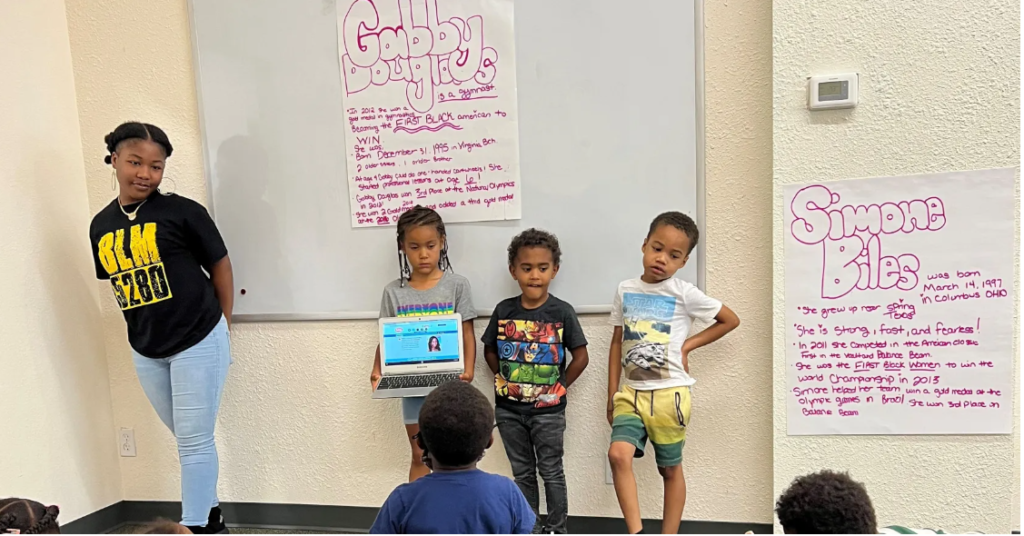
Courtesy of Michael Johnston and Kelly Brough
Neither of Denver’s candidates for mayor favors mayoral control of the school board, which has been beset by infighting and power struggles among board members.
That was one of the takeaways from a recent mayoral forum focused on education and hosted by EDUCATE Denver, Chalkbeat Colorado, and CBS Colorado.
The runoff election between Kelly Brough, the former head of the Denver Metro Chamber of Commerce, and Mike Johnston, a former educator and state legislator, is set for June 6.
Brough and Johnston won the most votes among a crowded field of 17 candidates in an initial election in April. But neither got more than 50% of the vote, necessitating a runoff election.
Below, read what Brough and Johnston had to say about that topic and more. The questions and answers have been edited for length. See the full video from the forum at the bottom of this story.
Youth gun violence is on the rise. After a shooting at East High School in March, the Denver Police Department agreed to station 14 police officers on 13 DPS high school campuses. What’s your position on police in schools? And who should pay for it?
Johnston: My position from the beginning has been that schools should get to decide whether they need that support. … I think that in terms of who pays for it, that’s a decision we can make together. If the district has the resources, they should pay for it. If the district doesn’t have the resources, then the city needs to step in and figure out how we get it done.
Brough: The most fundamental responsibility of government is to keep our residents safe. And so the question of who pays for it is the last concern we should have. Historically, the district has paid for school resource officers. But I said very clearly, as mayor, I would pay for those officers if that’s what a principal and a school have said they would like in their school.
Research shows a correlation between the presence of police in schools and discipline disparities, as well as unclear effects on school safety. If Denver police remain in schools, how would you ensure the district achieves its equity and trauma-informed goals?
Johnston: This is a matter of who you approve to do this work, what training they have to do this work, and what their scope of authority is in the building to do this work.
When I’m a school principal, I do not need a Denver PD officer to be intervening in two students arguing in the cafeteria. I do not need an officer to be ticketing people for cursing in the hallway.
What you need an officer for is when you have a student that you know has access to a gun, who you are afraid is bringing one to school, and you need someone to assist in a pat-down of that student to make sure they’re not armed.
Brough: I too, would emphasize making sure you have the right officers in schools with the training and support and feedback.
But I also want to talk about, you know, we’ve built systems throughout every aspect of our society that have bias in them around race in particular. And so I think each of our schools, whether we have a school resource officer in them or not, we have to be monitoring and tracking: What are we doing around discipline … and is there disparity based on race that we’re seeing there, so we can respond and address our own issues.
Would you consider mayoral control of the school board?
Brough: I don’t think you can tell the next mayor: Why don’t you fix the severe challenges we face in the city and county of Denver and take on the largest school district in the state of Colorado and see what you can get done over there too?
So I would not take on the school district.
Johnston: No, I don’t think that is a good plan.
I think that the democratic process works. There are a lot of people that are very motivated and very mobilized about the school board elections coming this November, probably more than I’ve ever seen in my adult life, because parents are really paying attention. … And I think their voices will be very powerful in what happens in the school board races and that they will get back the school board that they want and they feel like is responsive to them.
As indicated by the most recent state testing data, Denver Public Schools is not adequately supporting academic achievement among students of color or those who are low-income. What role can the mayor play in addressing the equity gap among students?
Brough: One is making sure we have a governing body that is focused on nothing else but delivering the education our kids deserve, supporting our teachers to be able to do it, and keeping everybody safe while we get it done.
The second is the role the city plays in supporting delivering our kids to the finish or starting line of graduation. For me that will include things like more partnership between the city and Denver Public Schools. …There’s more opportunity for the city and the schools to work together on maintaining grounds, on a range of issues from purchasing that we can save money.
The third thing I’m really interested in is the city serving as an employer, where we could partner with Denver Public Schools and kids would have paid internships and apprenticeships.
Johnston: It starts with the belief that Denver students are all of our responsibility.
One of the most important ways that we can do that is looking at all of the learning time right now that happens outside of the school building. All the things that happen outside of 8 a.m. to 3 p.m., where we know young people’s access to after-school programming to summer school programming to tutoring and arts and athletics and science camps …drive a big part of the passion that makes you who you are as a young person.
I want to expand programming to make sure young people, particularly those on free and reduced [price] lunch, have access to those opportunities to help them find their passion.
The other key area of partnership the city has let us down on is on mental health. … One of the things that Denver does is support Denver Health, which supports school-based health clinics around the city. We’ve not provided enough resources to make sure that in all of Denver’s high schools, we have an adequate supply of mental health counselors.
The DPS school board recently proposed a policy that would exclude standardized test scores from a public-facing information dashboard. Would you support building a platform at the city to share this information with families and community and to hold the district accountable?
Brough: I’m not an expert in standardized testing. Well, actually, I am really terrible at standardized testing because I’m dyslexic. … I don’t think I’m less smart than any other kid, even if my scores were lower, and I don’t think my teachers were any worse if my scores were lower.
I also want to know, though, how a school is overall doing as a parent. And it feels to me like we can find a way to try to communicate that information without oversimplifying it or unfairly … judging or burdening a school or a district or teachers.
Johnston: I would not support denying parents access to that information any more than I would support denying parents access to information on their kid’s height and weight chart on a yearly physical check-in. And also know that even if you tell my kid he’s in the 15th percentile of height, that I don’t think that’s his total measure of worth as a human being.
There are different data points that you gather, and they tell you different things about the progress of your child. And what you want to look at is a well-rounded group of data that helps inform me on what to do next.
It is getting increasingly expensive to live in the city of Denver. This is causing many lower-income DPS families to relocate outside of the city. How will you address this challenge?
Johnston: What I would do is build or convert 25,000 units across the city to become permanently affordable units. And what that means is that anybody that makes about $100,000 a year or less can be eligible to move into one of these units. And the way they’re structured is that you would never pay more than 30% of what you make for rent.
The next most important step is homeownership. … There I would do two things. One is to provide down payment assistance, which helps someone be able to buy a home for the first time. … And the other is to partner with organizations like Habitat for Humanity or Elevation Land Trust, where you can create land trusts where there are affordable homes you can buy.
You buy them at a discounted rate, and you sell them at a discounted rate. So you might buy a home for $300,000 instead of $600,000. But when you keep it for 10 years and you sell it at the end, you might only sell it for $350,000 … so that you keep it affordable for the next teacher on the next nurse on the next firefighter.
Brough: One of the strategies is called master leasing. This is where, as your mayor, you basically put out [a request for proposals], and you say, ‘I’d like 3,000 units for three years. What kind of deal will you give me?’ And in essence, what I’m doing is buying down the price of rent and locking it in for a few years. It also has the added benefit that if somebody gets in trouble and they can’t make their rent, … the city gets a phone call before someone’s evicted, which also helps us start to focus on prevention of people becoming unhoused.
Another example … and this is one that’s most exciting for me, is homeownership. … I got the chance in Munich to tour a building on a surface parking lot. … And when you look around our city, we have quite a bit of surface parking lots that we own as taxpayers. You can think of our police stations, our firehouses, our libraries, our rec centers. But even more valuable would be our Denver public schools, where there could be real opportunities for us to build a for-sale housing product next to schools that if teachers wanted they could live in.
And then the last thing I’ll give an example for is gentrification. … We’ve done some things like approving the option to build an ADU, an accessory dwelling unit. … But the truth is where we haven’t had gentrification yet, those are homeowners who probably can’t afford to [to build one].
I think we as a city can take way more proactive steps: We design the ADU by neighborhood that would fit in. We could even do a precision build where it’s 30% to 50% less expensive. Now we’re helping that homeowner get it in immediately and start to be able to get rent so they can stay on the property they already own and have additional income.
As mayor, what are the top three things you would do to make Denver the best place to raise children?
Brough: Making sure we have a mayor who can restore the safety in our city, throughout our city, because I think families are extremely concerned.
I think affordability is the second issue that is causing, pushing many families to leave our city. … Housing is the No. 1 strategy to address that affordability.
And you don’t have to go very far when you talk to a Realtor about the No. 1 decision of where families choose to buy a home is their school and their confidence in that school. And so I also think really focusing on how do we restore confidence in our residents that we have a school system that will be great for their kids and deliver the results they want.
Johnston: I think the three biggest drivers of people leaving the city will be: Do they feel it’s affordable? Do they feel it’s safe? And do they feel like they have access to great schools?
We’ve talked about affordability. And so I want to talk … about safety.
I believe we need 200 more first responders on the streets of our city — and I use the term first responders because what you know is you need different people to respond to different situations based on what the challenge is.
If you have someone in a mental health crisis, you actually don’t want to send an officer at all.
If you have someone who’s in a physical health crisis and potential overdose, you want to have a paramedic or EMT on site. You don’t necessarily need an officer.
But if you have places where there is an assault, or there’s a break in, or your car’s been stolen, or there’s been a shooting, you do want to make sure that you have officers that can respond. Right now, we are so short-staffed on each of those roles.
What is the main thing that distinguishes you from your opponent? And what is a similarity?
Johnston: I’ll do similarities first. I think we both have leadership experience. We’ve both led large and complex organizations. We’ve both been in the public sector and the private sector.
The key distinguishing characteristic for me … is I think the city faces a large number of very complex problems to solve. And I find solving those complex problems requires having a big vision for what’s possible. And then being able to build a really broad coalition to take that on, often with unlikely partners who don’t get along together. And then being able to stay at it.
That’s what I’ve had the opportunity to do over decades. … That was true as a school principal, working with teachers to get all of our kids to graduate. That was true in the legislature working to help undocumented kids get access to in-state tuition. … That was true when we were working on universal preschool for the first time statewide and had to bring together everyone from big tobacco companies to health industries to preschool advocates.
I think that ability to set a big vision, take on the hardest problems, build broad coalitions, and then deliver really historic results is what makes me unique in this field.
Brough: I was gonna say our sense of humor, but I’m actually funnier than Mike so you can’t do that one. I would say our passion and love for the city I think is a similarity.
For me, the biggest difference I see is I’ve actually run the city before when I was John Hickenlooper’s chief of staff. You’re responsible for the day-to-day operations of a city.
My lived experience has been much of what I think many in Denver are struggling with today. This is relevant because I think I understand how easy it is to give up hope.
When you lose someone you love to violent crime. Or how easy it is to feel so much shame that you’re not willing to keep going because your family receives assistance from the government. Or to believe that you’re the only family struggling with addiction and losing a loved one.
And I would say to every Denver resident, not only is my family resilient and strong, but I see it in you too, and I can help find a path through those issues today.
And then the last thing I would say is, I’ve never run for office before. … Maybe more importantly, though, I’m not running for another office. Every decision I make will be about the city and its residents and what’s best for us. Never about my political future.
Watch the entire forum below.




